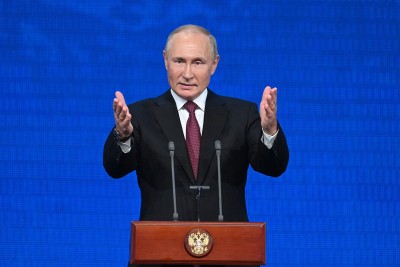Elections in Russia Also Held in Vienna: Between Protest and Farce
In Vienna, there were unusually long queues outside the Russian embassy as numerous young Russians lined up, sometimes for hours, to take part in the presidential election. However, their efforts were in vain as Vladimir Putin secured the elections in Russia, which were deemed neither fair nor honest internationally.
 Russia's presidential election is over, and Vladimir Putin is the expected winner, state television announced immediately after polls closed. / Picture: © Wikimedia Commons / www.kremlin.ru - The President of the Russian Federation [CC BY-SA 3.0 (https://creativecommons.org/licenses/by-sa/3.0)]
Russia's presidential election is over, and Vladimir Putin is the expected winner, state television announced immediately after polls closed. / Picture: © Wikimedia Commons / www.kremlin.ru - The President of the Russian Federation [CC BY-SA 3.0 (https://creativecommons.org/licenses/by-sa/3.0)]
This phenomenon, which took place all over Europe in front of Russian embassies, as reported by ORF, was primarily aimed at protest. The protest action "At noon against Putin" was interpreted by observers as a clear sign of protest against long-serving Russian President Vladimir Putin. At times, the queue of people waiting stretched for several hundred meters, a sight that, according to eyewitnesses, had never been seen in this form in previous elections. According to observations, the queue reached a length of almost 350 meters at peak times, which represents a significant increase compared to usual elections.
At the same time, the election in Russia itself was quickly decided by officials, as reported by ORF. According to state-controlled media and the election commission, President Putin achieved a "record result" and thus secured himself another term in office. However, critics and international observers described the election as staged and unfair, in which serious opponents were either absent or excluded from participation. In particular, the death of opposition figure Alexei Navalny and the systematic restrictions on Putin's opponents cast a shadow over the legitimacy of the vote.
The international community reacted with harsh criticism to the outcome of the election, as reported by ORF. The White House, the European Union, and other Western countries condemned the election as neither free nor fair, pointing to the systematic repression of political opponents and the restriction of freedom of expression in Russia. In particular, the confirmation of the death of prominent opposition figure Alexei Navalny by Putin himself and the exclusion of other critics from the election raise serious questions about the legitimacy of the election.
Despite the attempts at intimidation and the repressive measures of the Russian state, a remarkable wave of protests took place on election day. Russians gathered in Vienna and other cities around the world to demonstrate against the election, which was deemed undemocratic, and Putin's continued rule. These protests, some of which were accompanied by arrests, are evidence of a deep-rooted desire for political change and genuine democratic participation.
While Putin appears to be continuing to consolidate his power, the protests and international criticism show that his governance is increasingly being questioned. The events surrounding the election shed light on the complex challenges facing Russia, including demands for greater democracy and the rule of law, as well as increasing isolation on the international stage. The outcome of this election and the reactions to it could therefore have far-reaching consequences for Russia's future and its role in the world.



